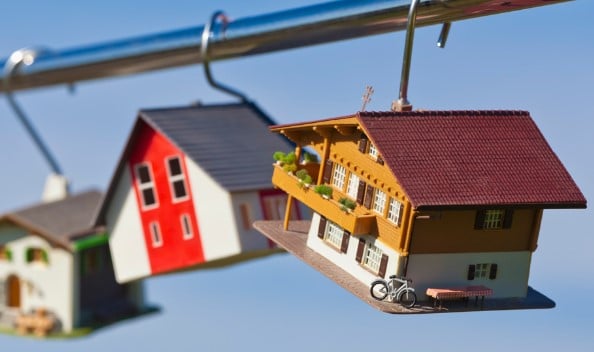What happens to property values in a recession?
Are we heading for a recession and what would it mean for the property market?
That’s a question I was recently asked by Yahoo Finance where I’ve been writing a regular property column for well over a decade.

Now that’s a good question because depending on which news bulletin you’re reading or which economist is giving their forecasts, the United States, and possibly the rest of the world including Australia, is on the brink of recession.
By the way… I don’t think we’re about to go into a recession, but below is my answer to the question posed to me together with those of realestate.com.au chief economist Nerida Conisbee as reported by Yahoo Finance.
But before that, here’s why…
I don’t think Australia will slip into a recession
Looking at the big picture we don’t have the typical precursors to a recession:
- We haven’t had the excessive optimism and the boom conditions you normally see prior to recessions.
- Globally inflation is very low inflation and central banks haven’t had to raise interest rates to slow down their economies – a frequent precursor to previous recessions
- We haven’t had a huge surge in debt around the world or high levels of cyclical spending on things like housing, investment or consumer durables that normally precedes recessions.
Back home many parts of the Australian economy are chugging along quite nicely with strong infrastructure spending and solid demand for our exports, especially mining.
What about the USA?
Well…Donald Trump doesn’t think the USA will fall into recession and his tweets can’t be wrong – can they?

Anyway…the following is the article that was originally published at Yahoo Finance which details my thoughts about how a recession would affect Australian property .
Fears of a US recession were ignited after the US-China trade war shook up global stock markets, including the ASX which saw $60 billion wiped from the local bourse last Thursday.

While economists don’t predict this on the cards, a US recession would nonetheless have direct implications for global growth – which will ultimately hit our struggling local economy.
And if a recession did hit Australia, what would happen to the national housing market?
According to Yahoo Finance property expert Michael Yardney and realestate.com.au chief economist Nerida Conisbee, house values aren’t destined to fall even if our economic growth does.
It’s jobs we need to worry about
“While we may have a ‘technical recession’ – a period of temporary economic decline with a fall in GDP in two successive quarters – it is unlikely to lead to significant falls in our property markets,” Yardney told Yahoo Finance.
“The concern for our property markets would be if people lost their jobs and couldn’t repay their mortgages, but this is unlikely to be an issue.”
Echoing Yardney’s sentiments, Conisbee agreed that job loss would be the main issue as it could cause houses to plunge into arrears.

While it’s a bleak picture, Yardney pointed out that mortgage arrears are currently low and in fact declined again last month.
At the same time, employment growth is “strong”, with 41,000 jobs added in June and the participation rate rising to a record high of 66.1 per cent.
“The economy has added a thunderous 910,000 jobs over the past three years alone,” he added.
So the property market looks well supported as the elements that would lead to a falling-out of the market aren’t there.
However, that doesn’t mean that we’re safe: how consumers spend will ultimately drive or prevent the nation into falling deeper into a recession.
“While the health our property markets are driven by fundamentals, which are in general looking good, the unknown factor will be consumer sentiment,” Yardney said.
“There is no doubt that if Australia’s economy slips into recession there will be a lot of media coverage that is likely to cause consumers to stop spending until the future looks clearer.”

It’s a bit of a self-fulfilling prophecy: if the media tells Aussies we’re in a recession, people will cut spending and hold off from making big decisions like buying a new home or upgrading their home if the economy isn’t looking good.
“This just perpetuates the poor economic situation,” said the property expert.
“That’s why governments respond by lowering interest rates and giving spending incentives to keep the wheels of our economy going round. Things like first home owner grants or incentives for businesses to buy new equipment or employ more staff,” he said.
“This means that if Australia does go into recession, our property markets will falter, but they won’t crash like the more volatile stock markets are likely to.”
Which areas could be hit hardest?
Say we do go into a recession: not all areas will be hit in the same way.
During the global financial crisis, Australia narrowly avoided going into a recession – but as the crisis was driven by the banking sector, Sydney – Australia’s premier finance hub – was worst-hit, while Perth fared particularly well thanks to the mining boom that helped create jobs and wealth.

“It is a little early to say what will happen this time around,” Conisbee told Yahoo Finance.
“The areas that see the biggest increases in unemployment will have the worst hit housing markets. One scenario could be a big lift in the WA economy as the US-China trade war forces China to buy more mining and agriculture from Australia, as opposed to the US,” she said.
“Melbourne and Sydney are more sensitive to multinationals cutting jobs and may be hit harder.”
“If this is the case, it could look like a post GFC-type impact.”
The bottom line
Yardney said there were various factors that affect property values across different areas and cities, such as what stage of the property cycle that area is in, as well as supply and demand, affordability, and local economic, jobs and demographic characteristics.
Though a recession – locally or overseas – will never be a good thing, our property markets are “in good shape to withstand this shock”.

“Our housing markets are in the best position they have been in a long time to withstand an economic hit,” he said.
So long as you can keep up your mortgage repayments, Aussie homeowners need not worry, Yardney said, even if home values do dip in a slowing economy.
“These slumps in property values are always temporary while the long term increase in property values is permanent.”
This article was originally published at Yahoo Finance, read the full article here.
- 8 Charts explaining why we’re in for a great time in property in 2021 - January 5, 2021
- New data shows COVID-19’s impact on Australians’ personal finances, including debt and insurance - December 21, 2020
- 4 key reasons why the property pessimists are changing their minds - October 12, 2020

